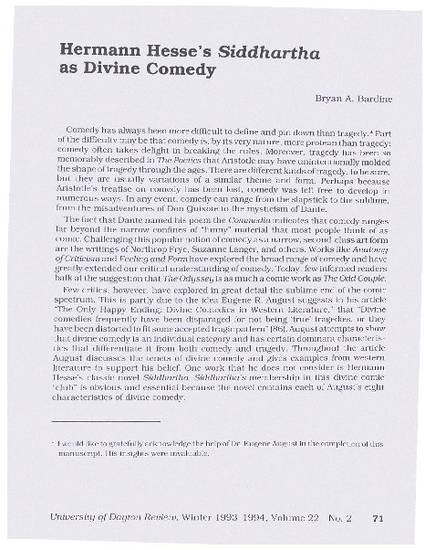
Article
Hermann Hesse’s 'Siddhartha' as Divine Comedy
University of Dayton Review
Document Type
Article
Publication Date
10-1-1993
Abstract
Comedy has always been more difficult to define and pin down than tragedy. Part of the difficulty may be that comedy is, by its very nature, more protean than tragedy: comedy often takes delight in breaking the rules. Moreover, tragedy has been so memorably described in The Poetics that Aristotle may have unintentionally molded the shape of tragedy through the ages. There are different kinds of tragedy, to be sure, but they are usually variations of a similar theme and form. Perhaps because Aristotle's treatise on comedy has been lost, comedy was left free to develop in numerous ways. In any event, comedy can range from the slapstick to the sublime, from the misadventures of Don Quixote to the mysticism of Dante.
Inclusive pages
71-79
ISBN/ISSN
0041-9524
Document Version
Published Version
Copyright
Copyright © 1993, University of Dayton
Publisher
University of Dayton
Peer Reviewed
Yes
Disciplines
Citation Information
Bryan Bardine. "Hermann Hesse’s 'Siddhartha' as Divine Comedy" University of Dayton Review Vol. 22 Iss. 2 (1993) Available at: http://works.bepress.com/bryan_bardine/3/

This document is provided for download in compliance with the publisher's policy on self-archiving. Permission documentation is on file.